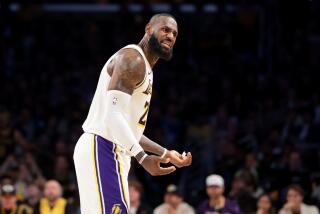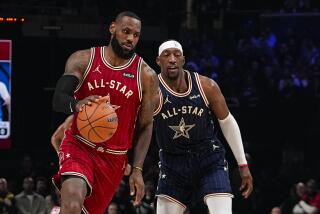An Inside Look at Outside Images
- Share via
PHILADELPHIA — They are three of the most analyzed athletes in America. They’d probably tell you they are three of the most misunderstood.
Kobe Bryant, Allen Iverson and Chris Webber, three of the most fascinating figures in sports, all played in the same NBA regular-season game for the first time Tuesday night, arriving in the same place after wildly different routes.
They have seen their faces on billboards and their names on police reports. They have heard the cheers and boos.
What’s it like on the inside of the fishbowl looking out? Before the Lakers played the 76ers, I asked all three what they thought about that fickle thing known as image.
“Image is everything,” said Webber, traded to Philadelphia by Sacramento last month. “Perception is reality. That’s what I’ve learned. So what I’ve tried to do is just be myself. Just be myself and do the things that I think God and my family would want me to do and try not to concern myself with image.”
What does he think his image is?
“Man, I don’t know,” Webber said. “I think just a bunch of negative things. Negative. From not wanting to shoot to win. I don’t know. I think it’s just negative. I think image disappears too. I think we all have short memories.
“Rasheed Wallace, everybody hated a year ago. They said he was terrible, a malcontent. Now he’s with Larry Brown, [and the NBA champion Pistons, so it’s] ‘He plays the game right, he’s a great individual.’ Rasheed was a great individual since I met him his rookie year [when they played for the then-Washington Bullets]. Rasheed always wanted to win. He ain’t changed none. What I’ve learned is, it’s all perception.”
Iverson, once known for his posse and disdain for practice now, amazingly, is bathed in the most positive light of the three. The new spin on him is that he’s the new, grown-up, AI.
“That whole image thing is blown out of proportion,” Iverson said. “I ain’t 21 years old anymore. I’m almost 30 years old. What do you want me to do, keep doing the same old? When I first came in this league, I didn’t know nothing about nothing. All I knew about was surviving from where I was from, getting out of the ghetto.
“Then somebody gives me millions and millions of dollars. You give somebody that never had nothing something, he’s going to make a lot of mistakes. I’ve got some that I still make, they’re just not as detrimental, because my lifestyle ain’t that no more. I’ve done did everything. I’ve done did all the running around, all of the wild stuff. It just ain’t me.
“It’s like, after all that, you go home and you’ve got a wife and three kids -- one on the way -- and they look at you to be the provider, be the one with the brains and be the one to run the house. And then when you leave out of there, you can’t even handle your life out there? How are you going to handle your life at home?
“Before, if something negative would happen with me, whether it be a spat with a coach or a missed practice or lateness or something like that, it was like, OK, it hurt, but I can get over it. Now I’m at the point where I’m too old for that to even come up. I don’t want to be detrimental to nothing that we’re trying to do.”
Does he care what people think about him?
“Honestly ... I do,” Iverson said. “I do when it’s people that are fair and willing to listen to what I have to say, willing to listen to my reasons without having to defend myself. I don’t want to be the person that, when my daughter comes home and she says, ‘Daddy, such-and-such in my class, their daddy said this about you, that you’re a mean person.’ She’s said that to me before. And that bothered me.
“I know I can’t satisfy everybody. But I do care about it. I used to be, when I was young, ‘Man, I don’t give a ....’ But that ain’t how you want to be. You do care.”
You know all about Bryant’s fall from grace.
Is he concerned about his image?
“Um, no,” Bryant said. “No and yes. It’s important that the image that’s out there is the real image of who I am as a person, not something that’s fabricated, not something that’s gossip, you know what I’m saying? From that standpoint, I care about it.
“It’s just about you doing what is right. I think it’ll all come out sooner or later. There’s a lot of [charitable] stuff that I’ve done in the past that I will continue to do that I don’t want credit for. I don’t want any. Because I don’t feel like that’s something that should be publicized.
“I hope, one day, people will look back at my career and see everything that I’ve been through, everything that my fans have been through ... and I just stayed steady. I didn’t wig out. I just stayed steady, I stayed professional.
“And at the end of the day, when it’s my last year, people can look back and say, ‘You know what? He had a hell of a career, he was a hell of a basketball player, a hell of a person.’ And then they’ll appreciate all the years prior to.”
He was booed again in his hometown Tuesday, in the same building where they booed him the day he won the All-Star game MVP award.
Twenty years from now, if they’re introducing all-time greats at an All-Star game, would he like to hear cheers following his name?
“I would love that very much.”
J.A. Adande can be reached at [email protected]. To read previous columns by Adande, go to latimes.com/adande.
More to Read
All things Lakers, all the time.
Get all the Lakers news you need in Dan Woike's weekly newsletter.
You may occasionally receive promotional content from the Los Angeles Times.







